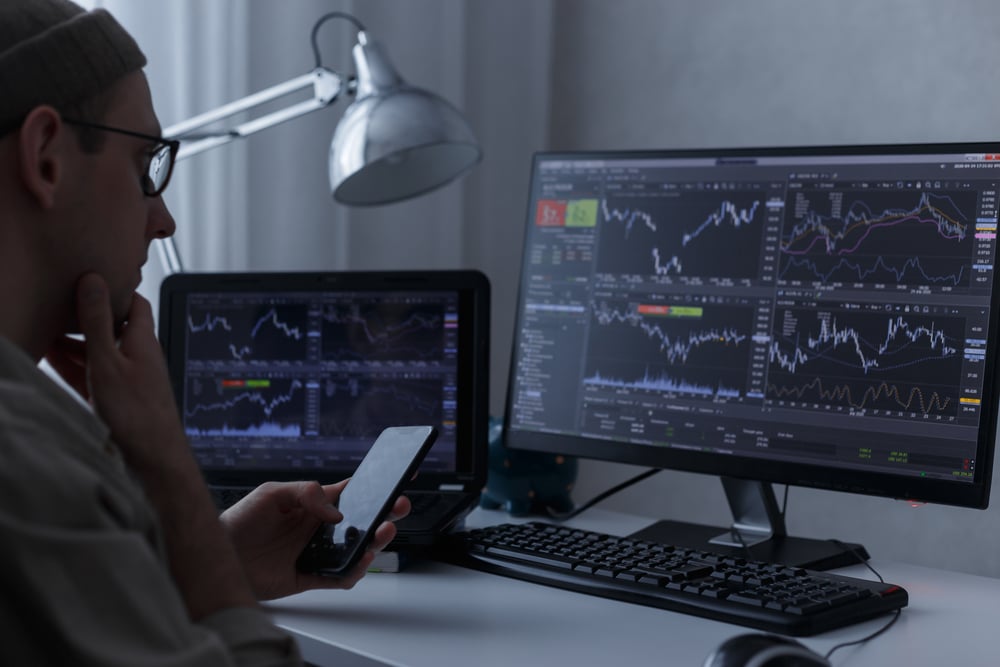
Trading psychology refers to the state of a trader’s mindset, which boils down to how they’re dealing with their emotions while making trading decisions. The most successful traders are those that can keep their emotions in check and remain rational while making their trades. The purpose of this article is not to invalidate these emotions. On the contrary, we aim to teach you how to control these emotions so that you remain clear-headed in all situations.
Why is trading psychology important?
Every trader knows that when trading in the financial market, extensive trading knowledge is vital to minimize losses and increase their chances of making a profit. Additionally, one needs to closely monitor the market and be aware of any trends and developments that may affect the asset they’re trading.
Trading psychology has the same effect on a trader’s success as the proper market knowledge and trading skills. A trader may be well versed with all the terms, all the analysis techniques, and trading strategies, but if they lack the mental discipline not to make rash decisions, they will still make consistent losses.
It is therefore vital for every trader to have a sound trading psychology. This can save them from making detrimental losses or at least reduce the impact of losses. Many times you will be faced with a situation where you need to act quickly, in either opening or closing a trade. In such moments, it is imperative that you keep a cool head so as to make a conscious decision.
There are several emotions that can have an effect on a trader’s decision-making. These emotions vary in every individual, but there are some universal feelings that plague us all. The most common universal emotions are fear, greed, anger, and impatience.
Fear is mostly seen when a detrimental development suddenly occurs in the market. Say, for example, the market crashes. In such a situation, many people will be quick to liquidate their positions to save them from further loss, and they’ll be wary of opening any new positions out of fear. Anger, on the other hand, occurs when a trader makes a loss. Out of anger, they try to hastily open new positions to recover their funds, which may lead them to further losses instead.
Impatience occurs when a trader makes a profit, but it seems almost too infinitesimal. Instead of waiting until they accumulate a significant profit, they scale up their positions or increase their leverage in a bid to make a quick buck. Though this may lead to substantial profits if it works, it also increases the risk of losing substantially.
Impatience is closely related to greed, which happens when a trader makes a profit, and now they can’t get enough. Such traders tend to open new positions carelessly, all in a bid to milk the profit-making trend for all they can get. However, the market usually makes drastic reversal swings after a prolonged trend, which if they catch you off-guard, could lead to drastic losses.
Another very common emotion is the fear of missing out or FOMO in short. This happens when the market makes sudden spikes, and most people have made significant profits on said spikes. In such an instance, a trader with FOMO may open a position in the direction of the spike’s trend, only for a reversal to happen and they lose their funds.
Improving your trading psychology
We have seen the effects that emotional trading can have on your trading outcomes. It is clear that a conscious and sound mind is just as important as the relevant trading skills and knowledge. Therefore, below are some pointers on how to improve your trading psychology.
Mind your personality
Different people have different personality traits. Some people are impulsive, while others are more reserved and take time to act on their emotions. If you’re an impulsive person, you need to take that into consideration so that when you’re filled with fear or greed, it does not take you by surprise, and you can try to control it. If you’re a reserved person, then you’ll know to trust your instincts when such situations roll by.
Formulate a trading plan and stick to it
When trading, it is important to have a plan that takes into account all possible scenarios. For instance, when opening a long position, you should have a take profit level, where you expect prices to hit on the uptrend, and stop-loss in case the market reverses into a downtrend. Such a plan will help you avoid closing trades prematurely and will also help you avoid big losses.
Don’t expect an immediate fortune
The biggest misconception people have is that you can make a fortune just by starting the forex trade or from making a single trade. This is a recipe for disaster. Instead, you will find that most positions you open will only give slight profits if any. But not to worry, this is the case even with the most seasoned traders. Successful traders will often stick to their plan, and ultimately, their cumulative profits will be something to write home about. Trading is more of a journey and not a get-rich-quick scheme.
Let go of your ego
Every trader makes losses once in a while, and you need to accept this fact. In fact, you may find that you’re making more losses than gains. However, with discipline and effective risk management, you can ensure your average gains outweigh your losses.
You should also always be willing to expand your knowledge, learn from other traders and employ new strategies to help you adapt to new situations.
Conclusion
Trading psychology is the mindset of a trader and how they manage their emotions when making trading decisions. Just like having the proper skills and knowledge, it is important to check your emotions while trading to avoid making rash decisions. You can improve your trading psychology by taking into account your personality type, formulating a plan and sticking to it, being patient, and checking your ego.







Leave a Reply